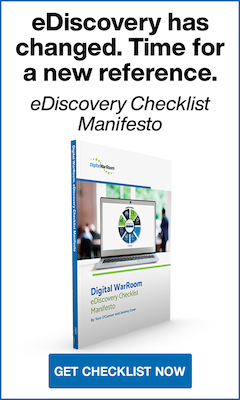The legal industry heavily relies on information. However, when an overwhelming amount of data is encountered during an eDiscovery process, it can be akin to navigating through a digital avalanche. Do not be afraid, courageous legal explorer! eDiscovery software has arrived to assist you in sorting through the digital wreckage and uncovering the truth.
Nonetheless, a fresh inquiry emerges: how can you effectively implement this crucial instrument? In this case, the divisions become apparent between on-premise vs cloud-based eDiscovery solutions. Rest assured, DWR will provide you with the necessary expertise to select the course of action that is most suitable for your legal journey.
What is The Difference Between On-Premise and Cloud?
Visualize your most valuable evidence - a digital cache brimming with essential documents. On-site eDiscovery is comparable to safeguarding this cache within your personal safe, where you are responsible for controlling its security and availability.
In contrast, cloud storage is comparable to leasing a secure storage box at an advanced facility - while someone else handles the maintenance, you still maintain control over your valuable possessions.
Understanding Cloud eDiscovery
Cloud eDiscovery utilizes the servers of a service provider to address your eDiscovery requirements. You can access the eDiscovery software and securely store your data on their platform, akin to utilizing a legal program accessed through the internet.
Advantages of Cloud eDiscovery
There are multiple benefits associated with this approach
- Cost-Efficiency: Disregard the need for significant initial investments in hardware or software licenses …. the total cost of ownership is NOT a mystery and assets do NOT have to be depreciated. Cloud-based solutions often function under a expense as you go subscription model, charging fees based on usage, which makes them financially accessible.
- Scalability on Demand: Looking to increase computational capabilities for a substantial case involving terabytes of data? No worries! Cloud-based eDiscovery solutions can seamlessly adjust processing power based on your requirements, guaranteeing access to the necessary resources precisely when they are needed.
- Remote Collaboration: The era of being tethered to your workstation has faded. Your team can now utilize the platform and examine files from any location with an internet connection, promoting flexible work arrangements and effortless collaboration, even spanning across different continents.
- Automated Updates: Bid farewell to software updates and maintenance troubles! The provider takes care of these responsibilities, allowing your IT team to dedicate their efforts toward more strategic endeavors.
- Strong Security: Esteemed cloud providers make significant investments in state-of-the-art security measures, providing a powerful safeguard against unauthorized access to data. Recognizing the importance of your information's privacy, they take extensive measures to ensure its protection.
Limitations of Cloud eDiscovery
Nevertheless, cloud solutions do have their own set of constraints:
- Data Security Concerns: Data security apprehensions may arise for enterprises handling exceptionally delicate information, such as proprietary information or medical records, when considering the storage of such data on third-party servers. Although cloud security measures are robust, certain individuals may prioritize the higher level of authority afforded by an on-premise solution.
- Internet Reliance: A reliable and consistent internet connection is vital for seamless functioning in the cloud. Troubles with connectivity can disrupt work processes and defer crucial duties. Consider the frustration of being moments away from an essential legal breakthrough, only to be hindered by a slow internet connection.
- Vendor Lock-in: Transitioning to a different service provider can be a challenging endeavor, mainly when dealing with significant data stored on their platform. It is crucial to carefully evaluate this aspect before fully committing to a cloud-based solution.
Understanding On-Premise eDiscovery
Installing the eDiscovery software and housing your data on your own servers at your physical location characterizes eDiscovery On-Premise Software. This method grants you full autonomy over your environment, instilling a sense of assurance when dealing with exceedingly confidential information.
Advantages of On-Premise eDiscovery
Benefits of utilizing an on-premise eDiscovery solution:
- Data Security: For organizations that possess highly confidential information, opting for an in-house storage solution can offer a higher level of assurance. Maintaining complete control over security measures and access protocols can minimize worries regarding potential breaches on third-party servers.
- Customization: On-premise solutions make tailoring the eDiscovery process to suit your organization's distinctive approach to managing legal affairs feasible, providing greater flexibility for aligning the software with your specific requirements and workflows.
- No Vendor Lock-in: Vendor lock-in is avoided as you are not bound to a particular provider. If necessary, transitioning to alternative software is facilitated without the concern of intricate data migration procedures. This empowers you with increased authority over your software selection.
Limitations of On-Premise eDiscovery
Drawbacks of eDiscovery solutions that are hosted on local servers:
- Upfront Costs: The purchase of hardware, software licenses, and the upkeep of the infrastructure can incur substantial costs. This initial investment can pose a significant obstacle for organizations operating with constrained budgets.
- Scalability Challenges: Scalability issues arise when attempting to expand processing capabilities to accommodate significant volumes of data, which could prove challenging and necessitate supplementary investments in hardware and software. On-premises solutions may lack the flexibility to handle unexpected surges in data demands effectively.
- IT Expertise Needed: A specialized IT team is necessary to handle the hardware, software, and continuous upkeep. This can pose a challenge for smaller organizations with limited resources to sustain a comprehensive IT framework.
Cloud vs on-Premise Cost Comparison
When it comes to cloud vs on-premise cost comparison, there is no universally applicable solution for on-premise vs cloud. While cloud-based options may appear more affordable initially, one must also consider the enduring expenses of extended subscriptions.
While on-premise solutions require a greater upfront investment, they offer the advantage of bypassing recurring subscription fees. Ultimately, the cost will vary depending on factors such as the size of your data, usage habits, and IT infrastructure. Below is a detailed explanation to assist you in navigating the financial terrain:
Cloud Costs:
- Subscription fees are typically based on data storage and processing power used.
- Predictable monthly costs make budgeting easier.
- No upfront hardware or software costs.
- However, ongoing subscription fees can add up over time.
On-Premise Costs:
- Significant upfront investment in hardware, software licenses, and implementation.
- Costs associated with ongoing maintenance and IT support.
- More control over costs in the long run, especially with high data volumes.
- Less predictable costs as hardware upgrades or additional software licenses might be needed.
If you are looking for information about eDiscovery For Law Firms, we can help!
Factors to Consider When Choosing Between Cloud vs On-premise
Having thoroughly examined the benefits and constraints of each method, let us now delve into the crucial factors that will shape your choice between cloud vs on-premise.
- Data sensitivity and security requirements: In the case of handling highly confidential data, an on-premise solution may be preferable due to its ability to provide ultimate control. Nevertheless, it would be unwise to underestimate the strong security measures implemented by top cloud providers. Assessing their past performance and certifications is essential to guarantee that they align with your organization's security protocols.
- Budget constraints: Private Cloud eDiscovery provides a more foreseeable, pay-as-you-use method, which can be advantageous for budgeting, particularly for entities dealing with varying data quantities. In contrast, on-site solutions demand a substantial initial expenditure yet may prove to be more economical for users handling substantial data volumes.
- Compliance regulations: Certain regulations may entail specific prerequisites for data storage. Ensuring that the selected solution complies with all pertinent compliance guidelines is essential. Particular sectors may enforce more rigorous data residency regulations that could impact your decision-making process.
- Organizational infrastructure and IT capabilities: Prior to making a decision, assessing your in-house IT resources and expertise is important. If you lack a dedicated IT team to handle an on-premise solution, the cloud's simplicity and minimal IT burden may be a more appropriate option.
The Ultimate Conclusion: Mapping Out Your Path!
When deciding between on-premise and cloud eDiscovery solutions, it is imperative to make a thoughtful assessment of your unique requirements, security prerequisites, financial constraints, and IT capacities.
By doing so, you can determine the most advantageous path to ensuring your organization's legal triumph. Do not hesitate to seek advice from IT experts and legal advisors to acquire valuable perspectives while navigating this crucial decision.
Keep in mind that the optimal resolution is the one that enables your legal team to effectively handle the eDiscovery procedure, discover the facts, and attain the most favorable outcome for your legal affairs.
FAQ
What is Cloud Computing?
Cloud computing is renting computing resources (storage, servers, software) over the internet instead of managing them yourself. Think of it like using online programs instead of installing them on your computer. It's cost-effective, scalable, and accessible from anywhere.
Is On-Premise Safer Than Cloud?
Security is a top priority for both cloud providers and on-premise solutions. Reputable cloud providers invest heavily in security measures. However, some organizations with highly sensitive data might prefer the extra control of keeping it on-site.
Cloud vs On-Premise Cost Comparison
Cloud: lower upfront costs, and predictable monthly fees based on usage. Good for fluctuating data volumes.
On-Premise: high upfront investment in hardware, software, and IT support. More control over costs in the long run for high-volume data users, but less predictable as upgrades might be needed.
What Is Cloud Ediscovery?
Cloud eDiscovery leverages a provider's servers for legal discovery tasks. You access software and store your data on their secure platform. It allows for remote access, automatic updates, and easy scalability.
-1.png?width=400&height=164&name=DWRLogoClassic%20-%20Copy%20(2)-1.png)









Comment On This Article